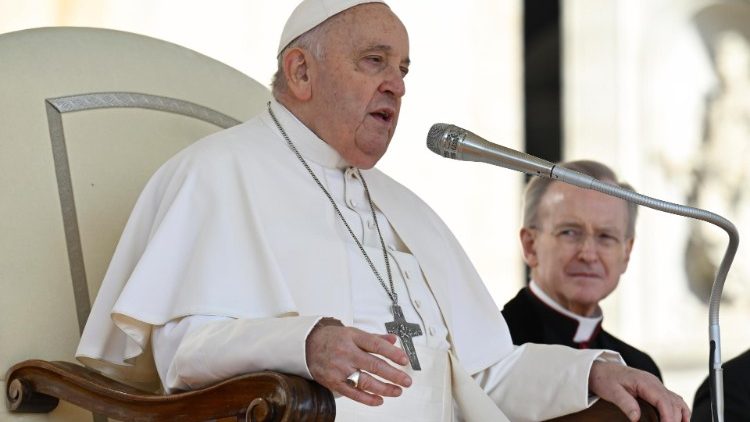Pope slams the ‘madness’ of war, urges the faithful not to ‘forget our Rohingya brothers and sisters’
The pontiff spoke about spiritual striving in his first general audience of 2024 in the Paul VI Hall, in the new cycle of the catechesis centred on vices and virtues, which began last week. Noting that “Jesus forgives everything,” he stressed that we must “regain this capacity to ask for forgiveness.”
Vatican City (AsiaNews) - Pope Francis held his first General Audience of 2024 at 9 am in the Paul VI Hall. In his address, the pontiff urged the faithful from Italy and the world not to forget those "peoples who are at war", reiterating that "War is madness” and “always a defeat”.
“Let us pray for people in Palestine, Israel, Ukraine and so many other places where war rages,” he said. “Let us not forget our Rohingya brothers and sisters who are persecuted," he added in a reference to the suffering people of Rakhine, in western Myanmar.
In his general audience, the Holy Father continued the cycle of the catechesis on "Vices and Virtues," which he began last Wednesday.
After reading the passage from the Gospel of Matthew (Mt 3:13-15), about the encounter at the Jordan River between Jesus and John the Baptist, Francis focused on "spiritual striving", a struggle that unites the life of all Christian people, for existence “is not peaceful, linear and without challenges; on the contrary, Christian life demands constant striving”.
For this reason, baptism, "the first anointing that every Christian receives," has no aroma, but suggests that "life is a struggle”; indeed, “in ancient times, wrestlers were fully anointed before the competition," he said. Quoting Abba Anthony, "the first great father of monasticism", he said: “Remove temptations and no-one will be saved”.
The saints too are prone to temptations, but they are “well aware of the fact that in life the seductions of evil appear repeatedly, to be unmasked and rejected.” And like the saints, everyone experiences such seductions.
“If any of you have no temptations, say so, because that would be an extraordinary thing,” Francis said, addressing his audience, warning against people who “absolve themselves, who declare they are ‘just fine’,” who poke fun at those who acknowledge their sins in the sacrament of Reconciliation. Such people “risk living in the dark, because we have become accustomed to darkness and no longer know how to distinguish good from evil”.
In this regard, Jesus provided us with a lesson, found in the "first pages of the Gospels", in the accounts of his Baptism in the Jordan. “[W]hy does Jesus submit to such a rite of purification?” asked the pontiff. Why does he do this for us?
John the Baptist himself is "shocked” and asks the Messiah: “‘I need to be baptised by you, and do you come to me?’ (Mt 3:15). Jesus "submits" and "queues up with sinners," the pope said, because “He does not embody the wrathful God and does not summon for judgement”.
Jesus leaves no one alone, ever. “He understands your sin and He forgives you. Never forget this! In the worst moments, in the moments when we slip into sin, Jesus is by our side to help lift us up. This brings consolation,” he explained.
After saying that Jesus forgives everything, since he came to "save," Francis pointed to the greatest obstacle that prevents Reconciliation – “it is we who, many times, lose the capacity to ask for forgiveness,” he said. This is why it is important to regain this capacity, for “Every one of us has many things to ask forgiveness for”.
At the end of the catechesis, the Holy Father asked the faithful in Paul VI Hall[*] to think about these things within themselves, and talk about them with Jesus.
[*] Also known as the Nervi Hall, named after the Italian architect Pier Luigi Nervi who design it.







.png)










